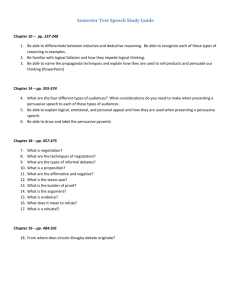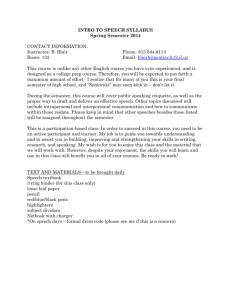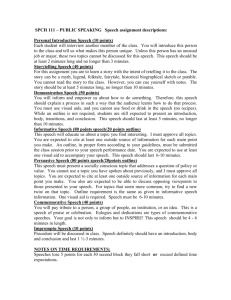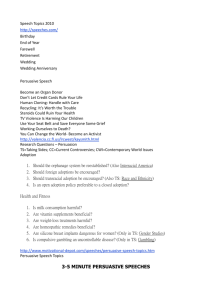English 3257 - Facultad de Humanidades
advertisement
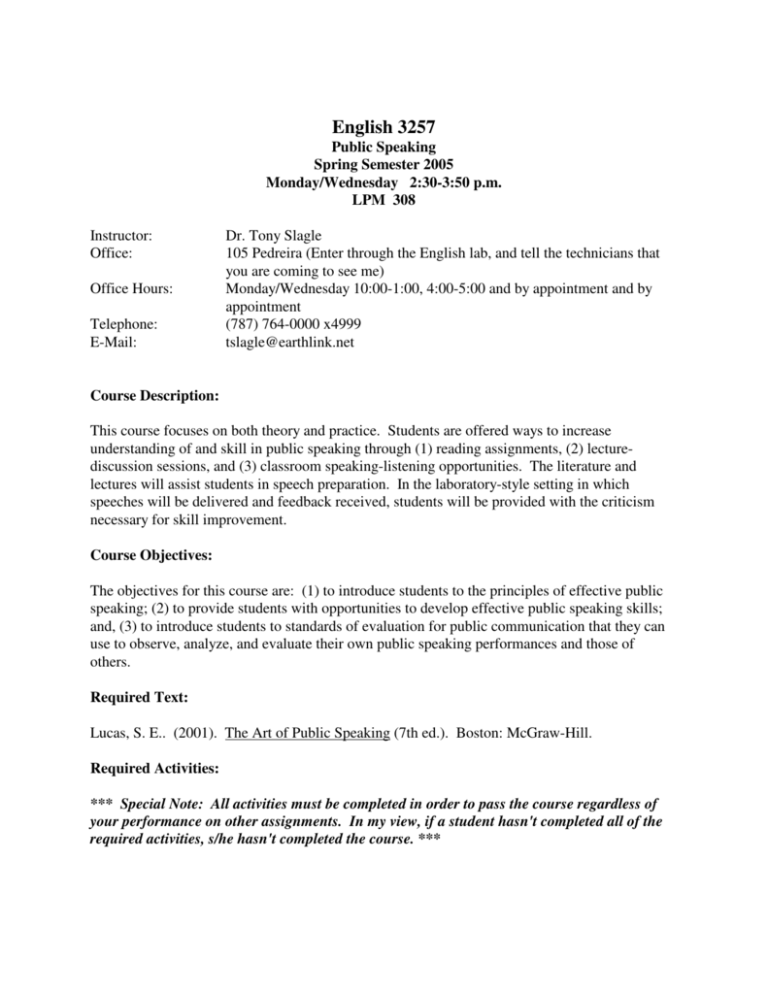
English 3257 Public Speaking Spring Semester 2005 Monday/Wednesday 2:30-3:50 p.m. LPM 308 Instructor: Office: Office Hours: Telephone: E-Mail: Dr. Tony Slagle 105 Pedreira (Enter through the English lab, and tell the technicians that you are coming to see me) Monday/Wednesday 10:00-1:00, 4:00-5:00 and by appointment and by appointment (787) 764-0000 x4999 tslagle@earthlink.net Course Description: This course focuses on both theory and practice. Students are offered ways to increase understanding of and skill in public speaking through (1) reading assignments, (2) lecturediscussion sessions, and (3) classroom speaking-listening opportunities. The literature and lectures will assist students in speech preparation. In the laboratory-style setting in which speeches will be delivered and feedback received, students will be provided with the criticism necessary for skill improvement. Course Objectives: The objectives for this course are: (1) to introduce students to the principles of effective public speaking; (2) to provide students with opportunities to develop effective public speaking skills; and, (3) to introduce students to standards of evaluation for public communication that they can use to observe, analyze, and evaluate their own public speaking performances and those of others. Required Text: Lucas, S. E.. (2001). The Art of Public Speaking (7th ed.). Boston: McGraw-Hill. Required Activities: *** Special Note: All activities must be completed in order to pass the course regardless of your performance on other assignments. In my view, if a student hasn't completed all of the required activities, s/he hasn't completed the course. *** English 3257, Spring 2005 Page 2 Teaching Strategies Lecture (50%) and student presentations (50%) Los estudiantes que reciben servicios de Rehabilitación Vocacional deben comunicarse con el profesor al inicio del semestre para planificar el acomodo razonable y equipo asistivo necesario conforme a las recomendaciones de la Oficina de Asuntos Estudiantes. También aquellos estudiantes con necesidades especiales que requieren de algún tipo de asistencia o acomodo deben comunicarse con el profesor. (Ley 51) Oral Assignments Introductory speech: A speech in which you introduce yourself by focusing on a personal object that represents a significant aspect of your background. This is a non-graded assignment. The speech should be 2-3 minutes long. Informative speech: A speech in which you inform the audience about a significant aspect of a culture different from your own. Possible topics include social customs, family traditions, holidays, clothing, food, religious traditions, sporting activities, and the like. The emphasis on this speech will be on organization, invention, and support. The speech should be 4-6 minutes long. Persuasive speech I: A speech in which you attempt to persuade the audience for or against a question of policy. You may seek either passive agreement or immediate action from the audience. You should deal with all three basic issues of policy speeches--need, plan, and practicality. You are required to use a visual aid for this presentation. The speech should be 5-7 minutes long. Persuasive speech II: For this assignment, you will speak on the same subject that you used for the first persuasive speech. In this speech, you will take the opposite view that you advocated in the previous assignment. This exercise is designed to enhance your ability to seek out, and to seriously consider, perspectives that might differ from your own. The ability to do this will help to develop your ability to make convincing arguments. The speech should be 5-7 minutes long. Commemorative Speech: For this speech, you will do a commemorative speech. The speech should be 4-5 minutes. In the speech, you might pay tribute to a person, a group of people, an institution, or an idea. The subject may be historical or contemporary, famous or obscure. Written Assignments Outlines: A complete preparation outline must be handed in with your graded speeches. The outline that you turn in before you speak should be more extensive than the speaking outline that you will use for the delivery of your speech. These are due on the day that you speak--before you English 3257, Spring 2005 Page 3 give your speech. The outlines that you turn in should be typed. The grade for your speech plans will be part of the grade for each speech. Exams: There will be a midterm and a final examination. The exams might include objectivetype questions (multiple choice or true/false). The second examination will not be comprehensive in nature. Course Policies: 1. Attendance is expected at all classes. Courses in speech communication require a high degree of class participation and interpersonal interaction. For this reason, students are expected to attend all classes. A strong emphasis will be placed on in-class participation and learning. Poor attendance prevents proper speaker/audience interaction in the classroom and will result in the reduction of your final grade. You are given three "freebies" (days you can miss the class). Each absence beyond three will automatically reduce your class participation grade by 5 percent. Students who do not or cannot attend classes regularly, for whatever reasons, cannot demonstrate that they have achieved the learning outcomes for the course. Students with more than three absences will find their grades affected. I am under no obligation to provide make-up assignments for students who have missed class. Finally, if you miss class it is your responsibility to get class notes from another student in the class. I will not provide copies of my notes under any circumstances. 2. Cheating, plagiarism, or other forms of academic dishonesty will not be tolerated in this class. It is not an acceptable defense to claim, “I didn’t know I was plagiarizing,” “I didn’t know what I was doing was plagiarism,” or “I didn’t know that plagiarizing was prohibited.” In an academic environment, plagiarism is one of the most serious offenses a student can commit. Plagiarism is the intentional or unintentional representation of another person’s ideas as your own. Plagiarism sometimes confuses students. It is plagiarism to turn in any portion of someone else’s paper, speech, or outline as your own work. It is plagiarism to use any portion of a speech or paper from a “file” of previously used speeches and present it in class as your original work. It is plagiarism to take passages from someone’s work and include it in a speech, paper, or outline without citing the original author. It is a form of academic misconduct to knowingly allow another student to use your work as their own, or to use another’s work as your own. All material submitted for evaluation must be the original work of the student. 3. Speeches must be delivered on the day that you are assigned. If you miss a speech, a make up will only be allowed with a legitimate and supportable excuse. In fairness to students who gave their speeches on time, a makeup speech will be evaluated more strictly to take into account the extra preparation time, and will translate into at least a letter-grade drop for that speech. Absolutely no speeches will be allowed to be “madeup” unless you contact me before the class (by telephone or email) in which you are English 3257, Spring 2005 Page 4 scheduled to speak. 4. On days when speeches are scheduled, please be on time. If you are late, do not walk in the room while someone is speaking. Wait outside the room until you hear applause. If you walk in the room in the middle of a speech, your grade for that speech will be penalized by ten points (out of 100). 5. Time constraints in public speaking are extremely important. Every speech has very specific time limits. In addition, you are allowed thirty seconds grace period (either shorter or longer). If your speech is more than thirty seconds too long or too short, your grade for the speech will automatically be reduced by 10 points (out of 100). 6. The exams will not be allowed to be taken late unless you call me (or email me) before the exam with a legitimate and supportable excuse. 7. Speech outlines are to be turned in on the day you speak, before giving your speech. Grade Distribution: . Assignment Weight Informative speech 15% Persuasive speech I 15% Persuasive speech II 15% Commemorative Speech 10% Exam #1 15% Exam #2 15% Quiz 5% Class participation 10% Total 100% Evaluación diferenciada a estudiantes con necesidades especiales. (Ley 51) English 3257, Spring 2005 Page 5 Tentative Course Schedule (subject to change) Date Topic Reading January 19 First Day of Class Distribute Syllabus January 24 Course Overview Expectations Assign Introductory Speeches Introduction to Public Speaking January 26 Introductory Speeches January 31 Ethics and Public Speaking Listening Chapter 2 Chapter 3 February 2 Audience Analysis Chapter 5 February 7 Choosing a topic and purpose Forms of Support Chapter 4 Chapters 6-7 February 9 Assign Informative Speeches Speaking to Inform Organizational patterns Chapter 14 Chapter 8 February 14 Introductions, Conclusions, and Transitions Outlining the speech Chapter 9 Chapter 10 February 16 Review for Exam February 21 No class, holiday (President’s Day) February 23 Exam #1 February 28 Informative speeches March 2 Informative speeches March 7 Using visual aids Speaking to Persuade Assign Persuasive speeches Chapter 13 Chapter 15 March 9 Reasoning Presenting the speech Chapter 16 Chapter 12 Chapter 1 English 3257, Spring 2005 Page 6 Date Topic Reading March 14 Review for Exam March 16 Exam #2 March 21 Semana Santa March 23 Semana Santa March 28 Persuasive Speeches #1 March 30 Persuasive Speeches #1 April 4 Persuasive Speeches #1 April 6 Language Chapter 11 April 11 Special Occasion Speaking Chapter 17 April 13 Quiz on chapters 11 and 17 April 18 No class, holiday (José de Diego) April 20 Persuasive Speeches #2 April 25 Persuasive Speeches #2 April 27 Persuasive Speeches #2 May 2 Commemorative Speeches May 4 Commemorative Speeches May 9 TBA May 11 TBA TBA=To be announced


